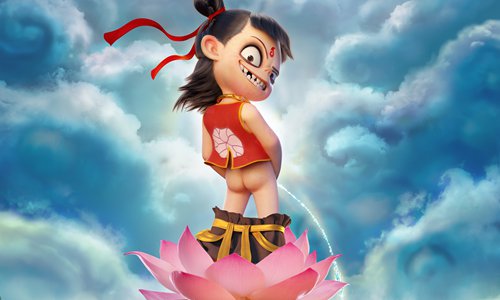
Photo: IC
Chinese film has not had an Oscar award since Crouching Tiger, Hidden Dragon in 2001 and the steeply rising cinema market did not even come close to victory after the Oscar nomination of Hero in 2003. Will Ne Zha, an animated film about a beloved Chinese mythical figure, a huge hit in the country this summer, break the 19-year Oscar statuette drought? Since the movie was selected to join the race of the best international feature film category at the 2020 Oscars, it has been the subject of heated online clamor among Chinese netizens.
Opinions differ. Some claimed it is the best Chinese animation movie ever. Yet others say it is still far from competing with Pixar's or Disney's productions.
Ne Zha is a blockbuster and has earned about $700 million in China alone. It also hit the big screen in North America in August, yet failed to replicate its astonishing performance in its home country. Reports say a majority of those who went to theaters for the film are local Chinese.
The film is about how a young boy breaks the shackles of fate and becomes a hero. As an animation about Chinese mythological character with well polished story line combined with futuristic visual effects, the movie clicks with Chinese audiences in a profound way. But it is hard to understand for Western audiences who know very little about Chinese culture. Some say they have seen just a pile of effects, others claim the story does not make sense and some argue the relationship between Ne Zha and the dragon looks weird, as if one were watching something like a gay narrative.
Cultural differences are perhaps one of the biggest challenges Chinese films confront abroad. Take Ne Zha, the core value of which "I am the only master of my destiny" may be difficult to touch the hearts of those who believe in god. Not to mention some of the jokes are based on Chinese culture and a lot of hilarious and touching points are lost in translation.
Few of my foreign friends watch Chinese movies unless they want to learn the language. They know little about Chinese films except Crouching Tiger, Hidden Dragon, and Hero. But these two films are about two decades old.
After the success of Crouching Tiger, Hidden Dragon, Chinese producers and directors were yearning to produce wuxia (literally meaning "martial heroes") films since they noticed foreigners are incredibly curious about it. Yet after introducing numerous similar movies abroad, more success is becoming elusive.
Chinese filmmakers then changed tack and exported different kinds of movies, including action flick Wolf Warrior II and science fiction film The Wandering Earth. Both represent China's huge step forward in film industry; these shattered box office records in China soon after their debut and won some applause among international audiences. However, about 99 percent of their global box-office earnings were contributed by Chinese people. Some foreign audiences found Wolf Warrior II pushing Chinese patriotism a little too far, while some say only Chinese attach that much importance to their houses and would choose to take home with them on their quest for salvation like the story of The Wandering Earth.
If a film is made for domestic audiences, quite a few Chinese movies deserve applause. But if it is for global audiences, producers might need to think twice about whether their stories will be well accepted by those who do not have a basic understanding of Chinese history, culture, philosophy and how to plug the gap through their stories under the circumstances.
Take the Hollywood make Thor, one does not need to know much about Norse Mythology or Beowulf or Valhalla or Yggdrasil to enjoy the story. Because the god of thunder Thor, the god of trickery, deceit, and shape-shifting Loki, and Odin, the supreme deity of the Germanic and Norse pantheons, are simplified into a maturing older brother, rebellious younger brother and an august father.
For quite a few Chinese fans, whether Ne Zha could win the Oscars is not that big a deal. The fact that more familiar mythological tales are no longer just legends, but can be enjoyed visually with huge digital improvements points to progress. Yet those artists wishing to introduce Chinese culture to the world need some hard thinking.
The author is a reporter with the Global Times. opinion@globaltimes.com.cn
